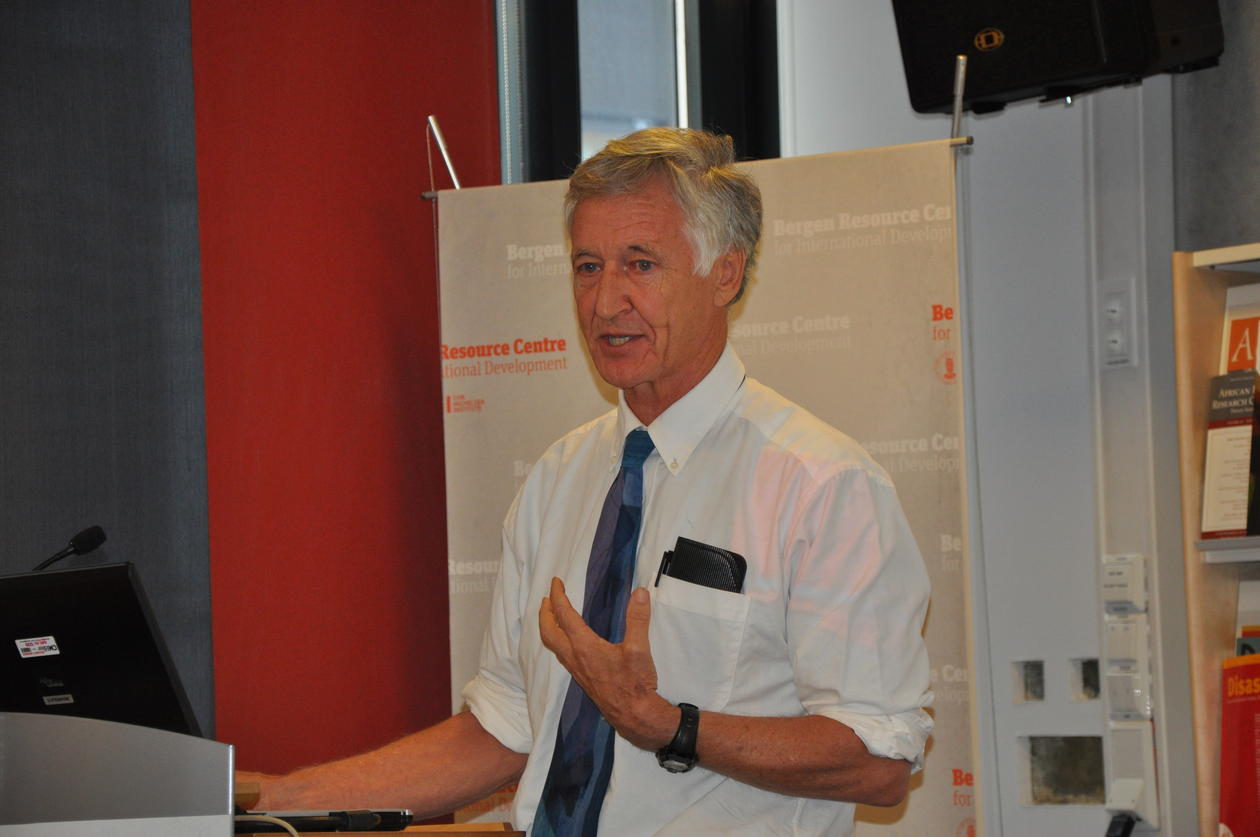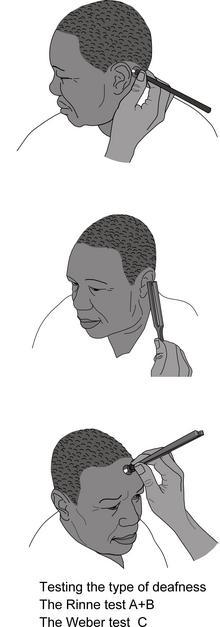Presenting a New Era of Open Access to Academic Knowledge
At a seminar on 14 December the author of "Neurology in Africa" told the story behind the book. UiB representatives described it as an ideal for the future.
Main content
There was not an empty seat at the Bergen Resource Centre for International Development, when Dr. William Howlett came to present his book Neurology in Africa. The book was written about Africa for Africa, and was edited in collaboration with the University of Bergen.
Editorial and financial assistance from UiB
Dr. Howlett wrote the book in five years, while working as a physician in Tanzania. The costs were covered by himself and the University of Bergen.
The book was published in September 2012 and is freely available on the internet, in keeping with the author’s own vision for the diffusion of medical knowledge. The University of Bergen has also printed 400 copies and made 500 CD versions of the book.
Neurology in Africa can be accessed here.
Much appreciation for Howlett’s work
Professor Gro Th. Lie of UiB Global welcomed the participants, and gave a special welcome to Dr. Howlett, with whom she has previously collaborated in Tanzania.
Head of the Department of Clinical Medicine Nils Erik Gilhus presented the field of neurology, and described brain disease as a global challenge. He called for progress on several fronts: research, guidelines and reviews, quality control, resources, education and text books.
– To have a book on neurology in Africa for Africa is important for both quality and identity, said Gilhus as he congratulated William Howlett on his book.
In need of skills and experience
In his presentation Dr. Howlett pointed to a low density and an uneven distribution of physicians in Tanzania. However, as in other Sub-Saharan countries, Tanzania has seen a number of new medical schools in the last 15 years, resulting in dramatic increase in the number of first-year students at institutions such as the Kilimanjaro Christian Medical University College in Moshi, where Dr. Howlett teaches medicine.
As for the main challenges facing physicians in Tanzania, Howlett said that skills and experience are bigger challenges than lack of information:
– Information has become more available through the internet. Skills are more difficult. No two cases are identical, so experience is the teacher. Therefore your need a modest view of a textbook. The name of the game is the interaction between patient and physician, said Howlett.
Making the book a useful tool for medical practice
This view both motivated the writing of the book and guided its focus:
– The aim was to write a book to assist with learning the necessary skills and knowledge to care for patients in Africa, said Howlett.
The focus of the book is medical practice, which was made possible by Christian Bakke’s layout and Ellinor Moldeklev Hoff’s illustrations:
– The illustrations give a sense of ownership to Africans. They are clear and wonderfully sympathetic. The feedback from Tanzania has included descriptions such as “lovely”, “beautiful” and “African”. The layout is simple and clear. The book is accessible throughout, and reader comments include the words “clear” and “attractive” said Howlett.
A lack of relevant literature
He pointed out that there are other books on neurology in the tropics. However they are not written with patient care in mind, making it difficult for medical students to cope with the richness of information found in these books. In addition there are still no text books available in Africa on AIDS, TB or malaria.
– There is a gap for every disease, said Howlett, who called these shortcomings “a stain on the reputation of the field”.
Neurology in Africa was therefore written on the basis of local experience, including disease patterns and resource limitations.
– Infections dominate, but they have not had much attention because of AIDS. The population is young, so noncommunicable diseases are less common. Paraplegia and neuropathy are more common, while multiple sclerosis is almost absent, said Howlett.
He emphasised the need for other open access books written for local circumstances, with care and teaching in mind.
– You ignore patient care at your peril, said Dr. Howlett, who has also made an instructional video on neurological examinations. A short clip of the video can be viewed at the beginning of this article.
A project to facilitate digital access to knowledge
UiB’s vice-rector for education, Professor Kuvvet Atakan, presented the DigUiB project, offering insight into the university’s plans for digital distribution of knowledge in the future.
– The project is divided in three components: Digital learning resources, digital lectures and digital exams, said Atakan.
The vice-rector presented availability of information as a major goal for the university, pointing to rights, archiving and visualisations as major challenges.
In a pilot project, the Centre for International Health (UiB) has started webcasting lectures to Africa, a practice which the university aims to implement throughout the institution.
Read more about the DigUiB project here.
Making academic literature accessible to all
Director at the University of Bergen Library Ole Gunnar Evensen offered details on UiB’s work towards open access to published papers, theses and books, in the Bergen Open Research Archive (BORA). Neurology in Africa can be found in this institutional repository.
– The aim of a repository is to maximise the visibility and impact of research, as well as the access to research at other institutions, said Evensen.
He explained the value of open access by means of harvesters and search engines, such as Connecting-Africa, which provides African research materials from all over the world. It is run by the University of Leiden in the Netherlands, and gives access to 34,387 publications from 89 repositories, including BORA.
Evensen also emphasized the importance of institutional repositories in Africa. The Uganda Scholarly Digital Library (USDL) at Makerere University, established with technical assistance from the University of Bergen, has contributed to a dramatic increase in the university’s visibility on the net.
A long history of collaboration with Dr. Howlett
Former head of the Centre for International Health, Professor Rune Nilsen, first met William Howlett in 1988, when the University of Bergen was working on HIV and AIDS in Tanzania. In his presentation Professor Nilsen told of very difficult circumstances in that period, including “an almost complete famine of literature”:
– We had to buy books and send them to Africa, because publishing houses didn’t trust African institutions. It was knowledge apartheid, said Professor Nilsen.
The Centre for International Health, represented by among others Gro Th. Lie and Rune Nilsen, participated in the Joint Tanzanian Norwegian AIDS Project (MUTAN). The project included several disciplines, working on research, competence building and intervention.
Arriving in Tanzania in 1988, Lie was the first Norwegian to work for MUTAN. She was charged with the responsibility of building an HIV/AIDS Counselling Programme, to train HIV/AIDS counsellors and to do research of relevance for coping with the disease at individual and programme levels.
At the time Howlett was working on neurological complications from HIV and AIDS, and soon started to collaborate with MUTAN. This in turn led to a close affiliation with the Centre for International Health.
The collaboration with the CIH continued into the 1990s, when Dr. Howlett wrote his PhD dissertation on tropical neurology at the University of Bergen. Neurology in Africa is the latest product of this partnership, as the University provided financial and editorial assistance during the writing of the book, at the initiative of Professor Nilsen.
Heartfelt congratulations from old friends
In reference to this history of personal collaboration, Rune Nilsen expressed his gratitude to Dr. Howlett:
– You taught us the lesson that one should never give up in the face of difficulty, and that high quality and access to knowledge are a global obligation. We hope that this will initiate a culture at the University of Bergen, said Nilsen.
In her closing remarks Professor Lie also expressed her gratitude for a long and fruitful working relationship with Dr. Howlett. She applauded his decades-long commitment to Tanzania, and described Neurology in Africa as a work driven by idealism, with no desire for personal financial gain.



